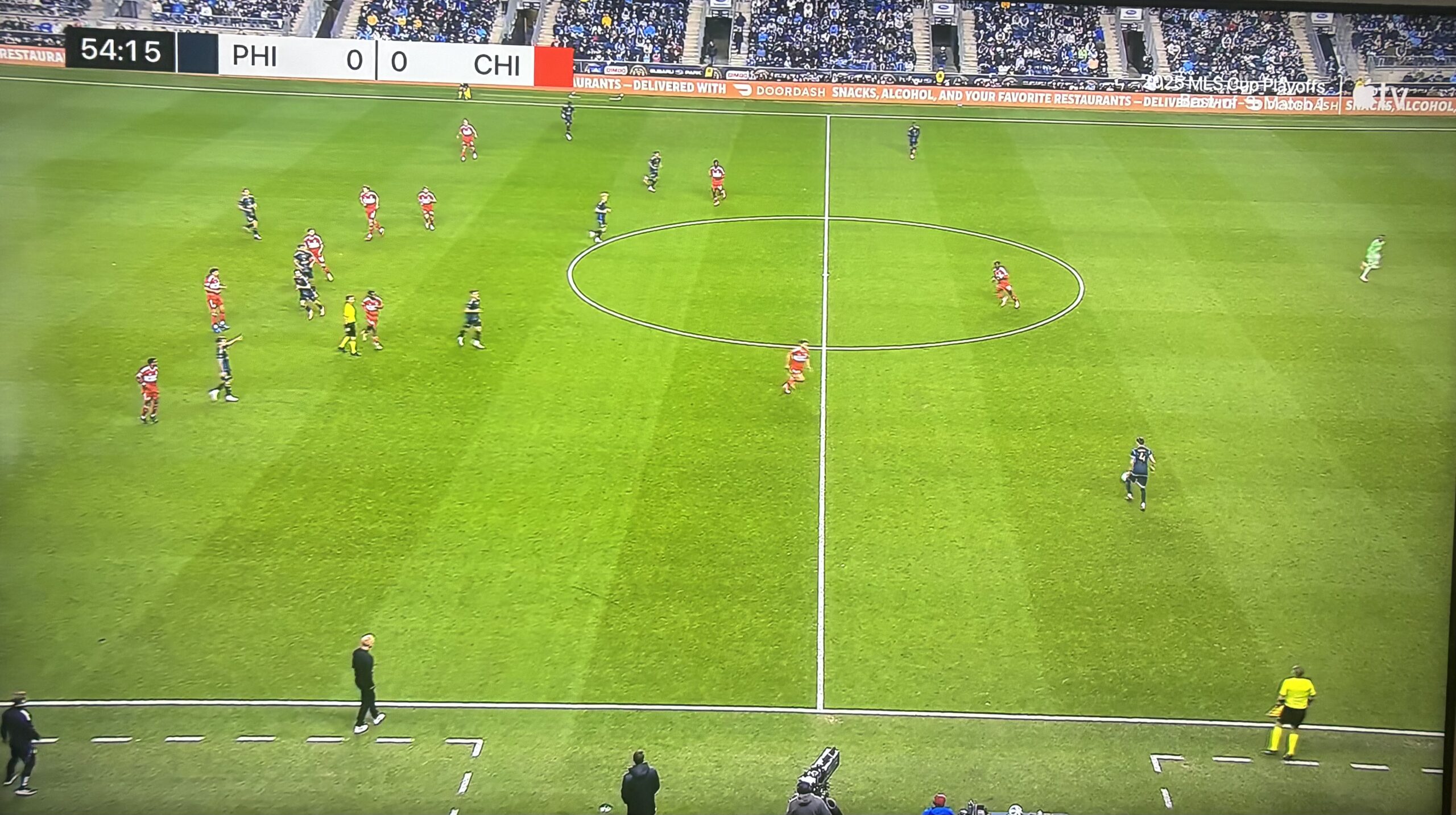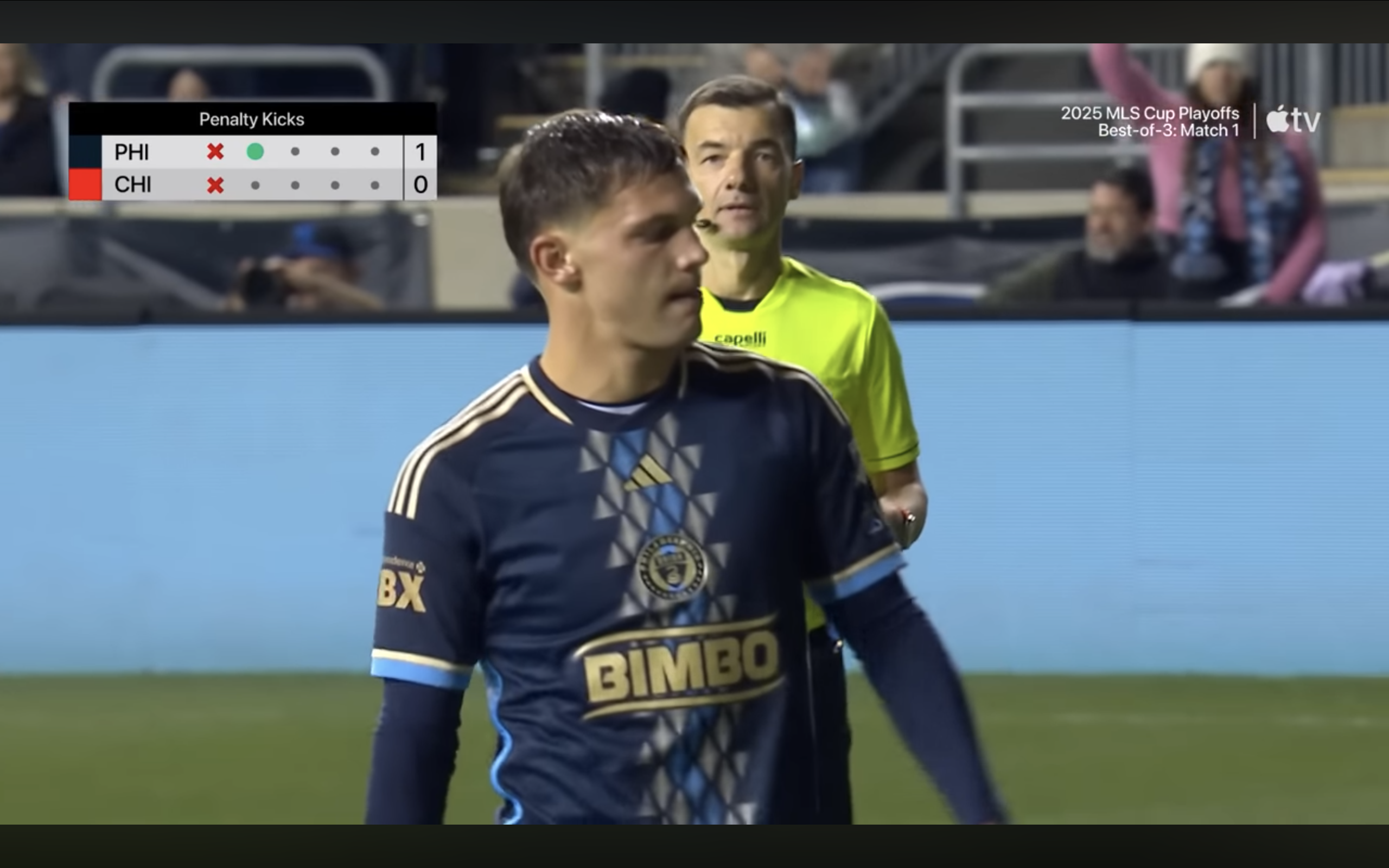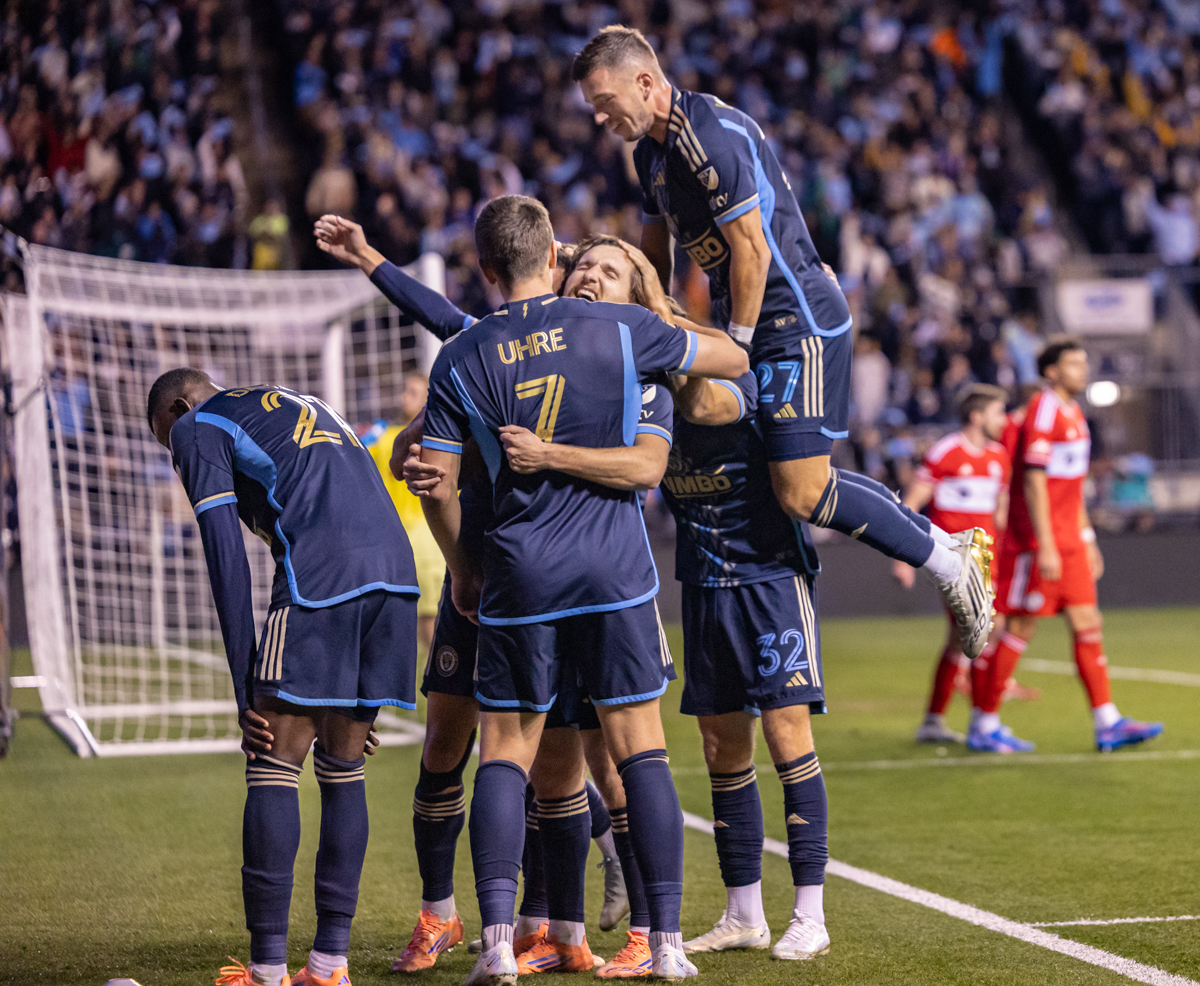Photo: Ron Soliman
The Philadelphia Union got their first taste of 2025 Playoff action Sunday evening, and not coincidentally, it was also a taste of “MLS After Dark” action for those in attendance. Notching two second half goals, then conceding two, and going to a penalty shootout after 90 minutes certainly wasn’t on Bradley Carnell’s bingo card. But MLS Playoffs tend to be a different beast than the regular season.
“I think we put on a really good display of what we tried to do,” Carnell stated. “We took our opportunities when they came, just a little unfortunate in a few moments and with the set piece there at the end.”
Yet, Carnell’s side showed supreme resilience in a tight spot, ultimately heading into Saturday’s Game 2 in Chicago with the chance to punch their ticket to the Eastern Conference Semi-finals.
The setup
After reprising his traditional high pressing 4-3-3 vs. Orlando in the Wild Card round, in this match Gregg Berhalter opted to go back to the 3-4-3 that had been a big part of his side’s strong finish to the regular season. Notably, Chicago went undefeated in their final five matches of the regular season, which made switching to four at the back for the wild card match a somewhat unexpected lever for Berhalter to pull.
On the other side, the Union came out in their standard 4-2-2-2, with Tai Baribo and Bruno Damiani leading the press, and Milan Iloski and Indiana Vassilev filling the space just behind them.
The game began with nervy and uneven play, as expected with the Union playing virtually no meaningful minutes in close to a month. Both teams traded throw-ins and restarts through the first ten minutes, with the Union coming close to drawing first blood off the game’s first corner.
The Union owned the lion’s share of possession throughout the first forty-five while they poked and prodded at the deep lying back-five of the Fire. Yet, the Fire defense were unmoved. Carnell’s side found space in the attacking flanks via the feet of Kai Wagner and Nathan Harriel in advanced wide positions. Both looked to whip in crosses early and often, as they struggled to successfully connect and combine with the front four in any meaningful fashion on the floor.
This was mostly due to Chicago’s back-line of five working so well together. They compressed the Union’s shape in possession, forcing both Damiani and Baribo into deeper spaces as both tried to show as outlets in build-up – both often doing so in a redundant manner. Ultimately, this egged the Union into play backwards more than intended, and left much of the space behind Chicago’s defense uncharted.
Chicago, on the other hand, looked to build out of a back four in possession. The Fire were able to play around the Union’s press fairly easily by deploying outside back duo of Andrew Gutman and Johnathan Dean into spaces just behind the Union tens, keeping Iloski and Vassilev positionally honest. As Chicago found these spaces in build up, keen interplay between the outside backs and wingers for Chicago created numbers advantages that became tough for the Union outside backs to manage from their advanced positions with the lack of support of their tens out of possession.
As the match inched toward half-time, akin to a chess match, the sense that one false move from any single player could lead to a breakthrough for either side grew imminent.
The second frame
Reaching the end of the first forty-five even at zero offered a brief pause in the collective anxiety to the 18,000+ in attendance Subaru Park. The staccato nature of the tilt carried over into the second forty-five minute period in seamless fashion. Every restart for Chicago became increasingly more of an opportunity for the Fire to tactically slow the game down and not allow the Union to gain any traction.
Carnell noted in his presser, “It was a contrast of two styles: one team trying to waste every second… and they probably got what they wanted with the penalties, but I’m glad we got through on the other side.”
Chicago’s deeper line from the first forty-five sat noticeably higher in the second half. Both Damiani and Baribo continued to check back into the middle a little too often without one of the two attempting to stretch the field. This continued to give Chicago’s back-three license to compress the Union’s shape even more, by stepping up on Baribo’s and Damiani’s backs and forcing play backward.

In an attempt to change this, Carnell looked to his bench in the 64th minute, bringing on Frankie Westfield and Mikael Uhre for Nathan Harriel and Bruno Damiani. As has happened at multiple junctures this season, bringing on Uhre changed complexion of match. With the Dane’s willingness to stretch the field, Philly were able to play a more vertical game without ceding to the compression the Fire had previously instilled in the Union’s shape.
Six minutes after coming on, Uhre made one of those field stretching vertical runs in behind catching up to a through ball, cutting back on his left and playing in a beauty of a ball to Vassilev. Indy did well to bring down the ball and finish low and to Chris Brady’s left, getting the Union off and running in the 70th minute.
With the Union up a goal, Berhalter quickly looked to his bench to instill a bit more attacking prowess to his side by bringing on creative midfielders Brian Gutierrez and Sergio Oregel. With these subs, the pendulum began to swing more prominently in both directions.
Chicago’s width that was afforded to them with the back-five dissipated, and altered into a back-four both in and out of possession. This created more space on the flanks for both teams that thrust the game into wide open back and forth action as both teams looked to open up the other in transition.
The Union were first to it, though, doubling their lead via the feet of Milan Iloski. Similar to the Union’s first goal, Iloski scampered onto the end of a Baribo through ball down the right flank, cutting inside and finishing coolly with his left peg in transition.
Chicago weren’t just going to go away that easily, though, and forced Andre Blake into some key saves. Credit to Chicago is due, as they fought and clawed their way back into a match the Union really should have put away.
As the seconds ticked by slowly and the Union retreating ever so slightly into their defensive shell, Carnell brought on fresh legs in the 82nd minute, subbing inCavan Sullivan and Jesus Bueno for Indiana Vassilev and Jovan Lukic.
Chicago found their breakthrough, when Jack Elliott climbed high to put his header off the post. The ball ultimately fell to the feet of Jonathan Bamba who made no mistake potting a goal to give Chicago life in the 84th minute.
Perhaps this was a moment where Carnell taking Harriel off hurt the Union, as Harriel would have likely man-marked Elliott on set-pieces. Although, the rationale for taking Harriel off likely included the foresight of penalty kicks, to which, Carnell deserves a ton of credit.
Now that barbs had been traded and Chicago had a foothold, the Union fought mightily to keep Chicago at bay. Glesnes slid at the feet of Hugo Cuypers just outside the box, giving Chicago a prime chance in the 93rd minute to draw level. The initial free kick taken by Bamba rang off the wall, but found the feet of Jack Elliott. The former Union man delivered against his old club, sending a worm-burner and out of Andre Blake’s reach into the back of the net from 25 yards out.
A game the Union had in their grasp ever so tightly, quickly began to slip away. As stoppage time ticked toward penalties, a red card was issued to Sergio Oregel for violent conduct on Kai Wagner after a coming together between Wagner and Gutierrez let to some extra-curriculars.
Ughh, penalties
Ninety minutes would not be enough to decide the victor, so to penalty kicks we would go. Luckily for the Union, Elliott’s luck must have been exhausted on the aforementioned strike, as he and Mikael Uhre traded opening PKs that were both saved.
With a fresh slate, Frankie Westfield, the nineteen year-old northeast Philly man, got the party started, blasting his penalty right down the pike. With a cheeky little glare at the keeper he’d just beaten, the momentum shift became so apparent, even Sergii Boiko was seen onlooking shaking in his boots.

“Frankie is Philly,” Carnell exclaimed in his post-game presser. “I think you’ve seen Frankie step up on numerous occasions… He created momentum, he created energy, and he played a big part in the momentum of the game and the shift of grabbing those two goals.”
Iloski and Baribo both stepped up and notched their penalties while Andre Blake watched Joel Waterman ring his penalty off the bar, all to deafening cheers from the River End.
This gave Jesus Bueno the chance to close it out for the Union, and, boy, did he. A cool, calm, and collected finish that sent Chris Brady the wrong way, and delivered a playoff victory in front of the River End for the first time in two seasons.
“It’s game one, that’s all it is,” said Carnell. “We’re through, we survived, and that is all it’s about.”
With another gutsy win added to the tool-belt of experience to draw upon, the Union pack up and head to Chicago with an opportunity to close out the series and move on to the Eastern Conference semis.


I can’t get enough of Frankie’s stare down of Brady.
Well done
One tactical point I noted was that often in the back five, the Chicago DMs would split wide a “show space” in the center. This is for two reasons: 1) the union like to attack the wings and cross, and having extra cover on each flank makes that harder, 2) it acts as a trap, by leaving the middle open it tries to bait the Union into playing central where the coverage is best and the possibility of turnovers increases.
My brain exploded when the Union conceded to make it 2-1 and then kicked the ball back to the other team. I understand doing it at kickoff of the first half way more